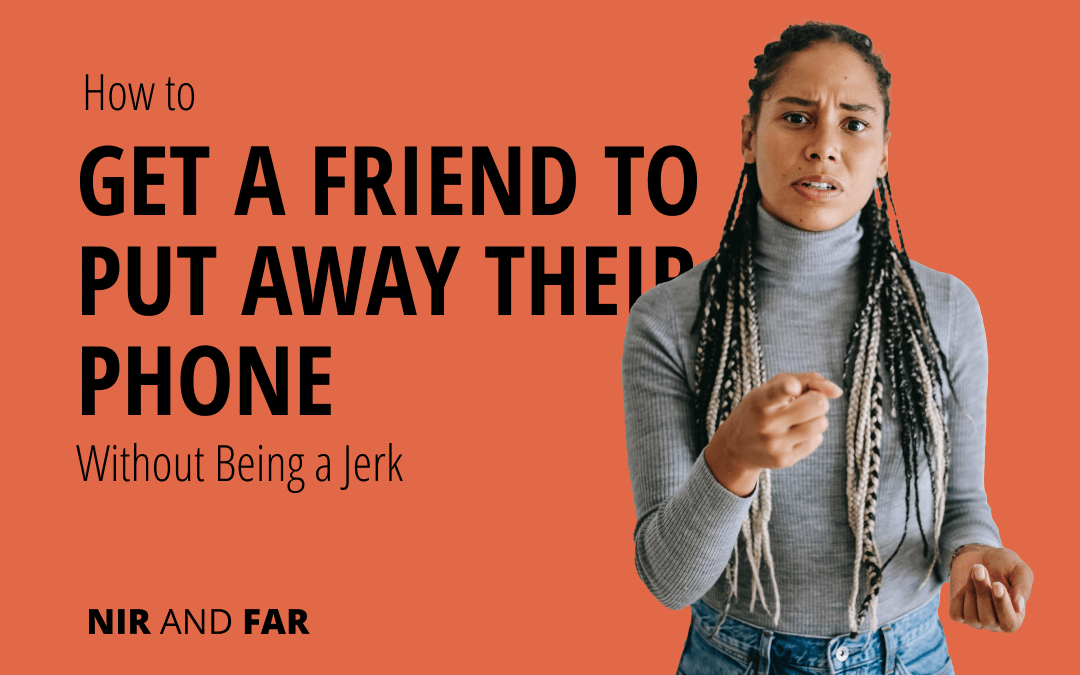Are we ever exclusively in our friends’ company? Our phones are almost assuredly present and ready to interrupt us with a poorly timed notification. Who hasn’t seen a friend divert their attention, mid-conversation, to reflexively check their phone? Most of us simply accept these interruptions as a consequence of our times.
Unfortunately, distraction is contagious. When smokers get together, the first one to take out their pack sends a cue, and when others notice, they do the same. Likewise, digital devices can prompt others’ behaviors. When one person takes out their phone at dinner, it acts as an external trigger. Soon, others are lost in their screens at the expense of the conversation.
Psychologists call this phenomenon social contagion. Researchers have found that it influences our behaviors, from drug use to over-eating. It’s hard to eat healthy if your spouse and kids insist on mowing down a dozen frosted donuts as you pick at your kale salad; it’s equally difficult to change your tech habits when your family and friends shun you in favor of their screens.
Given the enormous influence others have on our actions, how can we manage distraction when we want uninterrupted quality time with people How do we change our tendencies towards distraction when those around us haven’t changed theirs?
Paul Graham writes that societies tend to develop “social antibodies”—defenses against new harmful behaviors. Consider that in 1965, 42.4 percent of adult Americans smoked, according to the CDC. In 2019, that number was 14 percent. What happened?
Of course, legal restrictions played an important role in the precipitous decline in smoking rates. But there was also a major change in social customs. I remember my parents keeping ashtrays around the house in my childhood, despite being non-smokers. At the time, people smoked indoors, around children, at the office—wherever they pleased. My mother did her best to discourage the smoking habit by providing an ashtray shaped like a bony skeleton hand, but giving people that not-so-subtle reminder was the most she felt comfortable doing. In those days, it was considered strange, if not rude, to ask someone to go outside to smoke.
Today, things are very different. I’ve never owned an ashtray. No one has ever asked if they could smoke in my home; they already know the answer. It scares me to imagine the look on my wife’s face if someone were to light up on our living room couch; that person wouldn’t be in our house or even in our circle of friends for long.
We developed social antibodies
The remedy for distraction in social situations involves the development of new norms that make it taboo to check one’s phone when in the company of others.
Social norms are changing, but whether they change for the better is up to us.
The only way to make sure certain unhealthy behaviors are no longer acceptable is to call them out and address them with social antibodies that block their spread. This tactic worked with smoking, and it can work with digital distractions.
Let’s imagine you’re at a dinner party, and someone takes out his phone and starts to tap away. Embarrassing the person isn’t a good idea, assuming you want to stay friends; a more subtle tactic is better.
To help keep things cordial, you can ask a direct question that gives the person two simple options: (1) excuse himself to attend to the crisis happening on his device, or (2) kindly put away his phone.
Remember to be sincere—after all, there might really be an emergency. But more often than not, he’ll mutter a little excuse, tuck his phone back into his pocket, and start enjoying the night again.
Victory is yours! You’ve succeeded in tactfully using a social antibody.
Hack back your friendships
Unfortunately, it’s not just smartphones, tablets, and laptops that create distraction in social settings.
Many restaurants have wall-to-wall television sets, each with a different channel flashing headline news or a sports game. All this can easily disrupt conversations, sometimes even more than phones at the table. But perhaps if we develop social antibodies against unwanted phone use, the message will spread beyond our tables.
One thing is certain: if we’re not intentional about making time and space for distraction-free discussions, we risk losing the opportunity to truly know others and allow them to truly know us.
In the same way that society reduced social smoking with social antibodies, we can reduce distraction while with friends.
By getting agreement from our friends and families to manage distraction and taking steps to remove external triggers that don’t serve us, we can quarantine the social contagion of distraction while spending time with people we love.
Related Articles
- Schedule Maker: a Google Sheet to Plan Your Week
- Habit Tracker Template in Google Sheets
- The Ultimate Core Values List: Your Guide to Personal Growth
- Timeboxing: Why It Works and How to Get Started in 2024
- An Illustrated Guide to the 4 Types of Liars
- Hyperbolic Discounting: Why You Make Terrible Life Choices
- Happiness Hack: This One Ritual Made Me Much Happier

